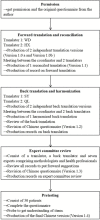Reliability and validity of the Mental Health Self-management Questionnaire among Chinese patients with mood and anxiety disorders
- PMID: 35966465
- PMCID: PMC9372341
- DOI: 10.3389/fpsyt.2022.952951
Reliability and validity of the Mental Health Self-management Questionnaire among Chinese patients with mood and anxiety disorders
Abstract
Background: Self-management plays an important role in promoting and restoring mental health for individuals with mental health issues. However, there is no valid and reliable Chinese tool assessing the self-management behaviors of people with mood and anxiety disorders. This study aimed to develop a Chinese version of the Mental Health Self-management Questionnaire (MHSQ-C) and to verify its psychometric properties.
Methods: A total of 440 potential participants were recruited by convenience sampling from June to August 2020. Item analysis and analyses of internal consistency, test-retest reliability, content validity, construct validity and criterion validity were performed.
Results: Data from 326 participants were used. Three factors obtained via principal component analysis and varimax rotation explained 53.68% of the total variance. The average content validity index was 0.99. The Cronbach's α coefficient (total: 0.874, clinical: 0.706, empowerment: 0.818, vitality: 0.830) and test-retest reliability (ICC: total: 0.783, 95% confidence interval (CI) [0.616, 0.882], clinical: 0.525, 95% CI [0.240, 0.725], empowerment: 0.786, 95% CI [0.622, 0.884], vitality: 0.748, 95% CI [0.564, 0.862]) were good. The MHSQ-C was well correlated with the Partners in Health scale and showed no floor or ceiling effect.
Discussion: The MHSQ-C is a reliable and valid tool to evaluate the self-management strategies of patients with mood and anxiety disorders.
Keywords: anxiety disorders; mental health; mood disorders; reliability; self-management; validity.
Copyright © 2022 Wang, Wang, Wang, Huang, Huang, Huang, Feng and Li.
Conflict of interest statement
The authors declare that the research was conducted in the absence of any commercial or financial relationships that could be construed as a potential conflict of interest.
Figures
References
-
- Maddux RE, Delrahim KK, Rapaport MH. Quality of life in geriatric patients with mood and anxiety disorders. CNS Spectr. (2003) 8:35–47. - PubMed
LinkOut - more resources
Full Text Sources



